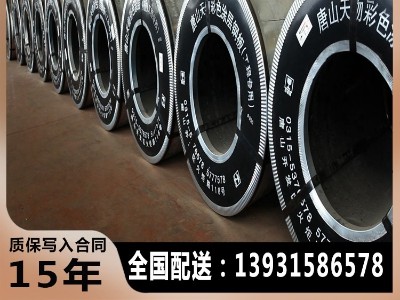彩涂镀锌板热镀锌和冷镀锌的价格区别
彩涂镀锌板工艺有热镀锌和冷镀锌两种。不同的镀锌工艺和效果也不同。它们之间的具体区别是什么?我们在选择时应该如何正确识别?关于这些问题,请参阅本文中的解释。
1
彩涂镀锌板彩涂板热浸镀锌工艺一般厚度大于10um,具有较强的防腐能力。所以这是一种常见的镀锌工艺。然而,冷镀锌很薄,大约3-5微米。彩涂镀锌板热浸镀锌表面粗糙光亮。严重的情况下,会有锌片。电镀光滑,呈灰色(脏)。电镀法生产的镀锌钢板具有良好的加工性能。但镀层较薄,耐蚀性不如热镀锌板。镀锌量很小,仅在管外壁镀锌(热浸镀锌-内外),仅10-50g/m2。其耐蚀性与热浸镀锌有很大不同。
2热浸镀锌板
彩涂镀锌板和冷浸镀锌板的镀锌量有很大差别。热浸镀锌的锌含量不能太小,一般两侧为50-60g/m2。冷镀锌板的镀锌层可以非常薄,达到15g/m2。但是,如果要求涂层厚度,生产线的速度非常慢,不适合现代生产线的工艺特点,一般在10g/m2左右。因此,冷镀锌板的生产受到很大的限制。
三。热浸镀锌板和冷浸镀锌板的涂层结构有着根本的区别。热镀锌板的纯锌镀层与带钢基体之间存在一层脆性复合层。纯锌镀层大多在结晶时形成锌片,镀层均匀,无气孔。然而,冷镀锌层中的锌原子只沉积在带钢表面,通过物理作用附着在带钢表面。空气中的孔洞较多,腐蚀性介质容易引起点蚀。因此,热浸镀锌板比冷浸镀锌板更耐腐蚀。
4热浸镀锌板和冷浸镀锌板的热处理工艺也完全不同。热浸镀锌板一般由冷硬板制成,在镀锌线上连续退火和热浸镀锌。钢带在短时间内加热后冷却,强度和塑性受到一定影响,在专业生产线上脱脂退火后的冲压性能比同一冷轧板差。冷镀锌板由冷轧板制成,基本保证了与冷轧板相同的加工性能,但其复杂的工艺也增加了生产成本。总之,热镀锌板生产成本低,应用范围广,已成为彩涂板市场的主要品种。
There are two kinds of galvanizing process for color coated galvanized sheet, which are hot galvanizing and cold galvanizing. Different galvanizing processes and effects are also different. What are the specific differences between them? How should we
make correct identification when choosing? With these questions, please see the explanation in this article.
1. The hot dip galvanizing process of color coated galvanized sheet is generally thicker than 10um, which has strong anti-corrosion ability. So it is a common zinc plating process. However, the cold galvanizing is very thin, about 3-5um. The surface of
hot-dip galvanizing is rough and bright. In serious cases, there are zinc flakes. The electroplating is smooth and gray (dirty). The galvanized steel sheet produced by electroplating method has good processability. However, the coating is thinner and
its corrosion resistance is not as good as that of hot dip galvanized sheet. The amount of galvanizing is very small, only galvanizing on the outer pipe wall (hot-dip galvanizing - both inside and outside), only 10-50g / m2. Its corrosion resistance is
much different from that of hot-dip galvanizing.
2. There is a great difference in the amount of galvanizing between hot-dip galvanized sheet and cold-dip galvanized sheet. The zinc content of hot dip galvanizing can not be too small, which is generally
50-60g / m2 on both sides. The zinc coating of cold galvanized sheet can be very thin, up to 15g / m2. However, if the coating thickness is required, the speed of the production line is very slow, which is not suitable for the process characteristics
of the modern production line, which is generally about 10 g / m2. Because of this, the production of cold galvanized sheet is greatly restricted.
3. There are fundamental differences in the coating structure between hot-dip galvanized sheet and
cold-dip galvanized sheet. There is a layer of brittle compound layer between the pure zinc coating and the steel strip substrate of hot-dip galvanized sheet. Most of the pure zinc coating forms zinc flake when it crystallizes, and the coating is uniform
and has no pores. However, the zinc atoms in the cold galvanized layer are only deposited on the surface of the steel strip, and they are attached to the surface of the steel strip by physical action. There are many holes to air, and it is easy to cause
pitting corrosion due to corrosive medium. Therefore, hot-dip galvanized sheet is more corrosion-resistant than cold-dip galvanized sheet.
4. The heat treatment process of hot-dip galvanized and cold-dip galvanized sheet is also completely different. Generally, the hot-dip galvanized sheet is made of cold and hard plate, which is continuously annealed and hot-dip galvanized on the
galvanizing line. The steel strip is heated in a short time and then cooled, so its strength and plasticity are affected to a certain extent, and its stamping performance is worse than that of the same cold-rolled plate after degreasing and annealing
in a professional production line. Cold galvanized sheet is made of cold-rolled sheet, which basically guarantees the same processability of cold-rolled sheet, but its complicated process also increases the production cost. In short, the production cost
of hot-dip galvanized sheet is lower, and its application range is wider, and it has become the main variety of color coated galvanized sheet market.
